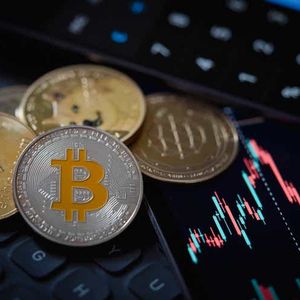Summary Since the introduction of spot cryptocurrency ETFs, inflows into such funds have been very significant. I delve deeper into the iShares Bitcoin Trust ETF - a popular spot Bitcoin ETF managed by BlackRock. I present the value proposition of investing in the IBIT ETF and also the potential concerns. I explain my investment recommendations with respect to the Fund for different types of investors, and maintain a neutral stance with a 'Hold' rating. The recent introduction of multiple cryptocurrency ETFs has taken the investor space by storm, and the amount of money going into these funds is not negligible. On July 6th, of 2024, Bitcoin spot ETFs recorded massive net inflows of $143.1m . This came after the price of Bitcoin dipped below a key support level of $54000. The token briefly fell below its 200-day EMA , and many investors and traders are looking to take advantage of these price movements. Among the many newly launched spot Bitcoin ETFs, iShares Bitcoin Trust ETF ( IBIT ) stands out to me. Let's delve deeper. The Good IBIT ETF serves to be a performance indicator of Bitcoin - the largest cryptocurrency token in the world. The fund has net assets of over $18b, and many investors consider IBIT ETF to be a good investment vehicle to gain exposure to Bitcoin price movements without the hassle of setting up a cryptocurrency wallet. Personally, I do believe that the fund provides a strong value proposition. Management Under BlackRock Total Assets of Bitcoin ETFs (VettaFi) We see that IBIT's net assets are the highest when compared to other popular Bitcoin funds, triumphing its counterparts from Grayscale and Fidelity. The sheer size of the fund is a testament to the reputation of its manager - BlackRock, which brings me to the next point - the growth of BlackRock's Bitcoin spot ETF holdings has grown tremendously, surpassing 38000 Bitcoins in early July. This is no surprise considering that BlackRock is the largest asset manager after all, with over $10 trillion in AUM, and it is clear that they are serious about providing retail investors exposure to cryptocurrency and blockchain investments. The strong backing of BlackRock is a key reason why many are subscribed to IBIT ETF compared to its other close competitors. Security and Convenience The convenience of investing directly into IBIT ETF, as opposed to purchasing Bitcoin directly, cannot be understated. However, it is the added safety of doing so that makes an investment into IBIT ETF potentially worthwhile. As the tokens are held securely by the trust, investors have less to worry about as compared to holding a wallet of their own, which is susceptible to hacks. Year-to-date, more than $1.38b worth of cryptocurrency tokens have been stolen by hackers, representing an increase of over 100% compared to the same time last year. While most may argue that the smaller, less regulated exchanges are the usual victims, the fact of the matter is that even the largest names in the crypto space are not immune to hacks. Even the renowned Binance exchange was hacked - with almost $600m in cryptocurrency tokens stolen by hackers. One can prevent such hacks by setting up a cold wallet, which is an offline hardware wallet. However, the sheer inconvenience of doing so results in many crypto investors settling for the less secure hot wallets online. Even lazier or less savvy people may simply leave their tokens in their preferred cryptocurrency exchange. IBIT ETF provides a way out from such security issues. While no wallet is completely immune from compromise, leaving the security matters to the folks managing the trust is often a safer option than doing it yourself, especially if one is new to the crypto space. Swerving Tax Reporting Complications Reporting your cryptocurrency transactions for tax reporting purposes is far from a simple process . Tax laws in this regard differ greatly from country to country, and the considerations are far more complex compared to usual capital gains taxes from investing in stocks and mutual funds. Exchanging one token for another, converting tokens to fiat and purchasing items with crypto may all lead to taxable events, and those who regularly trade or invest in cryptocurrency tokens for capital gains have to conform to these reporting standards. Such a process is far more convenient when investing directly into a fund like IBIT ETF. In this way, investors swerve tax reporting complications while still participating in the performance of Bitcoin. Bitcoin As An Inflation Hedge Fund advantages aside, many consider Bitcoin to be the next best inflation hedge, and I can understand why. The token itself has a fixed supply cap of 21 million coins, unlike other cryptocurrencies which may not impose such a limit. The whole point of the supply cap is to preserve the scarcity of Bitcoin, much like that of gold and precious metals. As such, holding Bitcoin is commonly seen as a store of value and a hedge against inflation as trillions of dollars continue being funnelled into the money supply. IBIT ETF seeks to track the performance of Bitcoin, and does so pretty well. IBIT vs BTC Comparison (PortfoliosLab) The above chart shows a strong correlation of 0.77 between IBIT ETF and BTC-USD. There are periods of premiums and discounts relative to the price movement of BTC, but we see that over the past 6 months, the price trends of both instruments have been near identical. As such, one can consider an investment in IBIT ETF similar, though not completely identical, to holding Bitcoin as an inflation hedge. The Bad While the above are all solid reasons for investing in IBIT ETF, I do have a few concerns. Fees and Price Differentials Bitcoin ETF Fees (NerdWallet) We see from the above that IBIT ETF's expense fees are certainly not the most competitive, losing out to counterparts from Franklin Templeton, Bitwise and VanEck. One may make the argument that investing directly into the token instead removes the recurring fund expenses and also allows investors to participate in the actual price movement of Bitcoin, as opposed to that of a fund that closely correlates to it. Another point is that the correlation of 0.77 between IBIT ETF and BTC-USD, while decently strong, still leaves a little to be desired. Lack of Fundamentals A long unsolved problem with cryptocurrency as an investment is the lack of fundamentals. Usually, ETFs are comprised of equities, bonds or other traditional asset classes to either replicate an index or achieve a certain investment objective. These investment instruments can be evaluated for their intrinsic value, as they possess tangible underlying fundamentals. For example, one can easily use a discounted free cash flow model to calculate the fair price of a stock. The metrics used are obtained from the company's financial statements, and the assumptions and projections are based on the perceived value and growth of the company's products and services. However, these fundamentals become a lot more ambiguous when it comes to cryptocurrency. While it is true that we are seeing increased adoption of blockchain technology, and substantial fund inflows to popular digital tokens like Bitcoin and Ethereum, there is little to justify why the price of one Bitcoin needs to be worth over $50000. It's mostly sentiment and market forces at work here, and until today, Bitcoin remains more of a speculative investment or trading vehicle, as opposed to a real tangible asset whose value is grounded in fundamentals. Investing in IBIT ETF does not change the narrative, given that the fund has a near 100% allocation in Bitcoin. As such, it's difficult to comment on whether the token's value will trend upwards in the long run, or if the current price is overvalued, undervalued or just right. This is also why movements in Bitcoin prices are so violent and volatile as compared to other asset classes. For a risk-averse investor, this may not be ideal. Opportunity Cost Investing in a speculative ETF like IBIT ETF has significant opportunity cost, as the same amount could have been invested in a low-cost index fund like SPDR S&P 500 ETF ( SPY ) which has years of proven historical returns, and is also rooted in tangible fundamentals of the 500 largest companies in the US stock market. For those looking to invest in the future of blockchain, the iShares Blockchain and Tech ETF ( IBLC ) may also be a more viable and less speculative alternative, as the fund is invested in companies with significant blockchain and cryptocurrency adoption, as opposed to the token itself. From a fundamental perspective, IBIT ETF pales in comparison to these options. The Bottom Line IBIT ETF is likely one of the best investment choices if you are looking to gain exposure to Bitcoin. However, I do have my doubts with regard to Bitcoin itself as an investment. Risk-seeking investors can consider having a small proportion of their portfolio invested in such tokens, as there is every chance that their value may go up tenfold or even more in the future. However, this is more of a speculative bet than an investment decision grounded in fundamentals. As such, risk-averse investors may want to consider other investment instruments. Personally, it's tough for me to determine if Bitcoin is a 'Buy' or 'Sell' at its current valuation from a fundamental perspective. However, I do believe that having some skin in the game is not a bad idea - and investing a little into IBIT ETF is one of the best ways to do so. My overall neutral stance on IBIT ETF has led me to issue a rating of 'Hold'.












